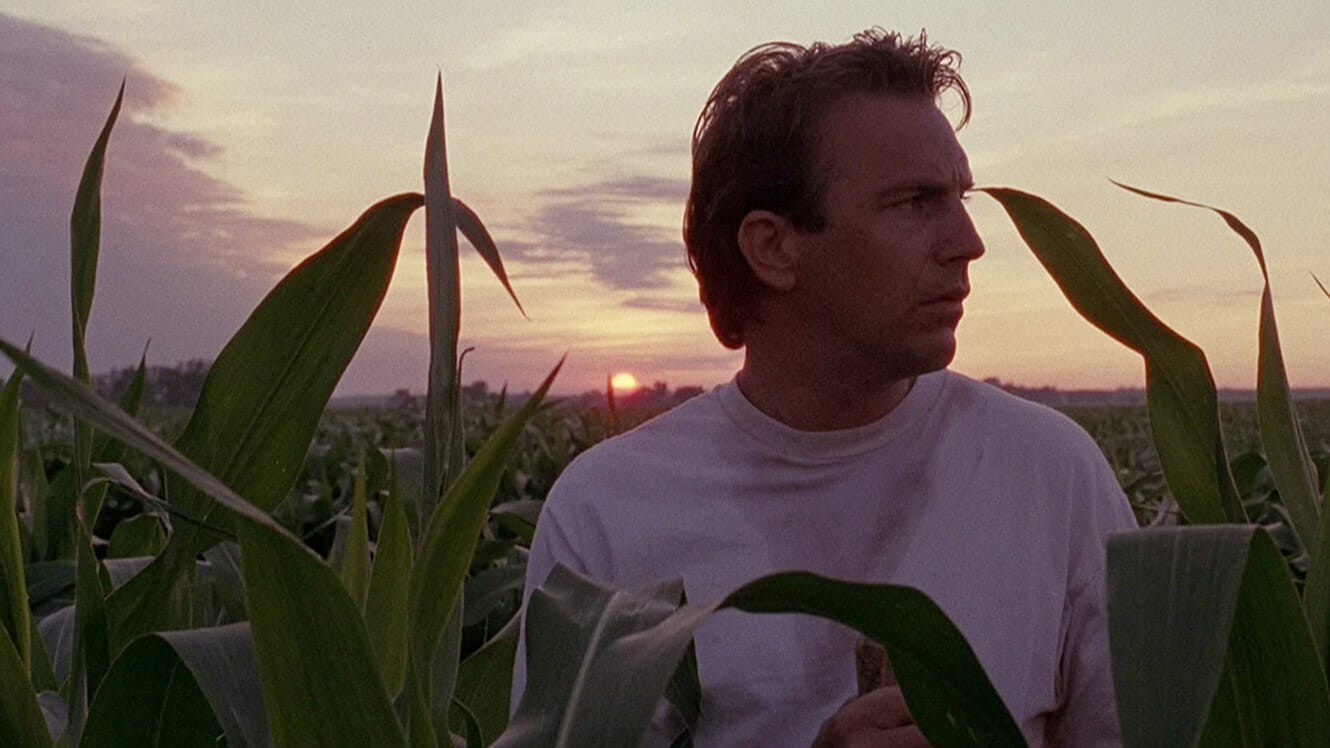
*This article was originally published on RealClear Religion
One quiet evening, under the soft red glow of a Midwestern sun, Ray Kinsella (Kevin Costner) strolls through the corn stalks on his farm in Dyersville, Iowa. He and his wife, Annie (Amy Madigan) — who met at Berkeley where his major “was the Sixties” — moved closer to her roots in the Hawkeye State, even though he knew nothing about farming. They then had their daughter Karin (Gaby Hoffman).
Still, despite the tranquil evening, Ray’s soul is amiss: he fears he is turning into his father. He “never forgave” his old man for growing old; and they often fought over a myriad of reasons, even baseball, a game they both loved. Yet Ray never reconciled with his estranged father. He passed away before meeting Annie and Karin.
However, as Ray admits to Annie, “The man never did one spontaneous thing in all the years I knew him,” adding, “I’m afraid of that happening to me.”
Then, in the wind, Ray hears something, a light voice: “If you build it, he will come.”
It’s one of the most well-known movie lines — and the catalyst for the ensuing action throughout Field of Dreams, which celebrated its 35th anniversary on May 5. But the voice is not a command, nor even an ask. It offers an invitation. However, its presence alarms Ray, to the point where he believes Annie and Karin are toying with him. When he confirms they aren’t, he dismisses the message.
But the voice keeps speaking to him, and Ray becomes more frustrated not knowing what to build or who will come if it is completed. Finally, the vision is revealed to him in time: to construct a baseball diamond in the cornfield. At first, Ray believes he is crazy, which is understandable. Not everyone hears a voice in the wind. In truth, he displays a healthy skepticism for we cannot run forth listening to every “voice” or instinct we hear. He actually discerns the task. But once he realizes the voice’s truth, a fire is stoked in his soul, and he sacrifices nearly everything to discover what will happen.
He surrenders himself to the mission — a country-spanning, time-jumping journey that, ultimately, leads toward reconciliation with his father.
Ray is not a prophet in the biblical sense, but he is much like Elijah, who heard God in “a light silent sound,” because he acted in accordance with the voice. Indeed, when one is baptized in the Catholic Church, they are anointed priest, prophet and king. Being a prophet then is one identity when “we become members of Christ” through the waters of Baptism, as taught by the Catechism of the Catholic Church. And like the Apostles on Pentecost, when they received the Holy Spirit, we are to “Go, therefore, and make disciples of all nations,” as Jesus commissions them — and us — at the end of Matthew’s Gospel.
All Christians are like Ray: we carry the pains and burdens of the past and present, yet the Holy Spirit calls us to surrender our egos toward something greater. Indeed, Field of Dreams is certainly a movie about nostalgia for the national pastime. And it is also a movie about father-son bonds. But, at its core, it shows the beauty of what happens when we say “yes” to God’s invitation. Ray’s “yes” not only heals his own heart, but his father’s, his family’s dynamics, the pain of ‘Shoeless’ Joe Jackson (Ray Liotta) and Terence Mann (James Earl Jones) and even helps fulfill the dream of Dr. Archibald “Moonlight” Graham, whose ‘cup of coffee’ in the majors ended without an at-bat.
However, on that field in Iowa, Graham finally gets his chance and affirmation from the other ballplayers of his talent. Meanwhile, the banned 1919 White Sox team has a chance to redeem themselves and play simply for the love of the game. As souls are spiritually rejuvenated on the field, several players ask Ray “Is this Heaven?” but he responds, “No, it’s Iowa.”
Ray’s quest is also attractive — having a delightful, infectious spirit. When his brother-in-law is hammering him to sign over the farm or risk foreclosure, Karin and Terence affirm that “people will come” to watch games “and it’ll be as if they’d dipped themselves in magic waters.” This is confirmed in the film’s final shot when a seemingly endless stream of cars files toward the Kinsella house. People need joy. This perfectly demonstrates how one person’s “yes” to the Holy Spirit reaches beyond our mere comprehension, building something more powerful than sin’s darkness.
What would the world be like if the Blessed Mother said “no” to the angel to bear the Word Incarnate? Or Elijah to the “light silent sound”? Or if the Apostles went back to their homes, to their old lives? How many lost souls would there be? The same is true for you and me: God is calling us in our own way. Those prophets and saints who came before — apart from the Immaculate Mary — are fallen, broken creatures in need of mercy and grace. They were not perfect, but they were perfect for the task God invited them to do.
Perhaps our task (or mission) is not as daunting like constructing a ballfield — yet it’s just as significant to others and our very souls. Ultimately, the Holy Spirit wishes to work in tandem with humanity to build the Kingdom of Heaven and we all have a role in creating something truly eternal.
The greatest lesson Field of Dreams offers, then, is to discern and act wholeheartedly, and to go where you are being led courageously without half measures, without fear. If we do so, in the end, whatever world we build around us, will not be Iowa — it will be Heaven.



Excellent review. A great movie.